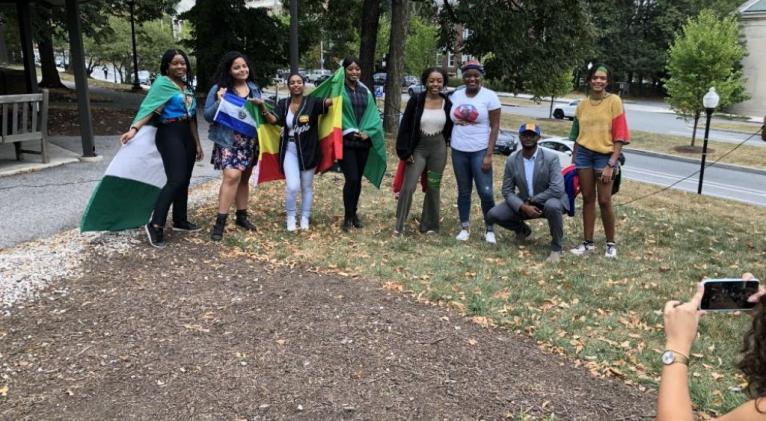Caribbean Cultural Society hosts community BBQ
especiales

The Caribbean Cultural Society hosted the Rep Your Flag BBQ outside AMR I on Sunday in collaboration with the Black Student Union, the African Students Association, OLÉ and the Hopkins Eritrean and Ethiopian Society. The event encouraged students to embrace their diverse heritages and identities with pride.
Sophomore Jevon Campbell, the events chair of the Caribbean Cultural Society, felt that the BBQ was an important way to start building a community for freshmen at Hopkins.
“I definitely want to make sure that the freshmen on campus are able to find these spaces, and really... build these connections,” he said.
Freshman Siena DeFazio said that she appreciated the BBQ and expected that others would as well because it did not place a huge demand on her time. She could just show up and enjoy herself, a model for student events that she said appealed to her.
“There’s a Cuban organization here, but also it’s a big time commitment, so I haven’t done anything with it yet. I’m looking not just for a club affiliation, but more for a community,” she said.
Many students, like sophomore Ashraf Nawari, found that the event represented a welcoming space where they could freely celebrate their cultural heritage.
“I think it’s a really good event for people to come out and show people their culture and celebrate it,” Nawari said.
Campbell said that he felt that a virtue of the event was that it shone a very positive light on a community that he felt can at times seem very dispersed. The BBQ reminded Campbell of his community’s solidarity.
“I always joke there’s like 20 Caribbean people here at Hopkins, which is not exactly true, but it feels that way for sure,” he said.
Freshman Jonathan Lee said the event was enjoyable as it encouraged students to embrace their diverse backgrounds.
Lee stated that he appreciated it especially because of what he considered the relative homogeneity of his hometown.
“I come from a predominantly white state, so just being able to mix with other cultures and to learn about what they believe in is something that I’m really happy to learn,” he said.
Students said that the event felt like a home away from home.
“I came because I’m homesick. Back home where I’m from in Florida, there’s like a 90 percent Caribbean population,” DeFazio said.
Some students enjoyed the connection between different Caribbean cultural groups.
Junior Valeria Villanueva thought the cross-cultural theme of the event brought more students out.
“Usually students tend to stay in the same groups if they find people they’re comfortable with,” she said.
However, students also noted that there were limited opportunities to identify and represent their heritage in other parts of their lives.
Nawari also pointed to the burden on cultural groups to run most of the cultural events.
“Most of the cultural events I go to are usually run by most of the cultural organizations. Obviously, OMA does a lot of different events with us too, but outside of that, not that I know of,” he said.
Campbell noted that Caribbean community at Hopkins was overly fragmented with many events with different cultural groups.
Cross-cultural connections between different Caribbean groups, in his opinion, were still less visible than they should be.
“[Students are] from different countries in the Caribbean, so they might be from Puerto Rico or Cuba, so they might not necessarily come to a Caribbean Cultural Society event but they might go to a Puerto Rican Association event,” Campbell said. “It’s not as concentrated as I would like at Hopkins.”
Villanueva stated that the tendency to limit cultural expression to this type of event prevents students from fully engaging with their heritage.
“If you don’t seek to get involved in cultural events, you can go through your time at Hopkins without really learning about them or participating in them. You have to be fully interested in order to do so, and that kind of sucks,” she said.













Add new comment